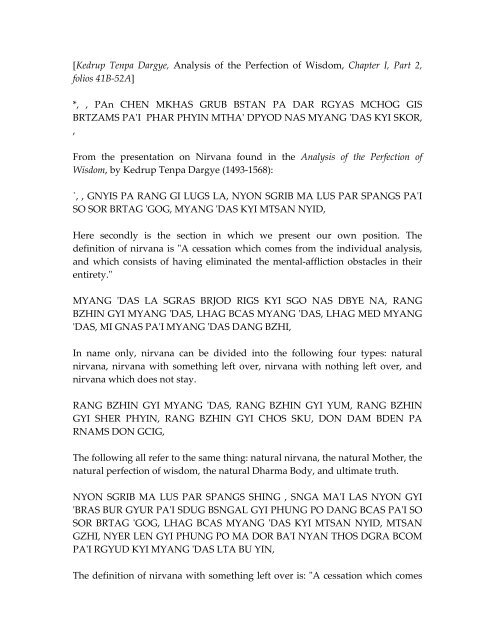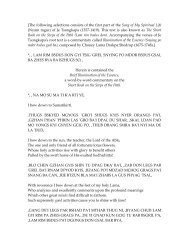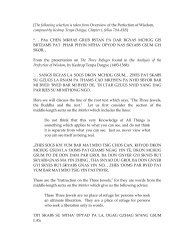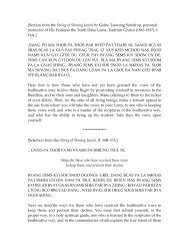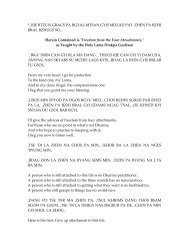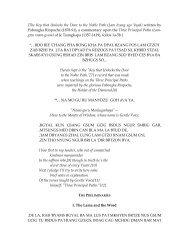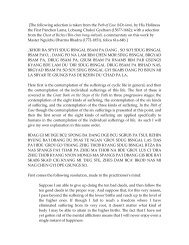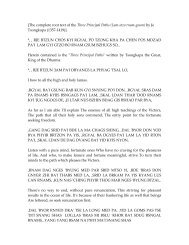[Kedrup Tenpa Dargye, Analysis of the Perfection of Wisdom ...
[Kedrup Tenpa Dargye, Analysis of the Perfection of Wisdom ...
[Kedrup Tenpa Dargye, Analysis of the Perfection of Wisdom ...
You also want an ePaper? Increase the reach of your titles
YUMPU automatically turns print PDFs into web optimized ePapers that Google loves.
[<strong>Kedrup</strong> <strong>Tenpa</strong> <strong>Dargye</strong>, <strong>Analysis</strong> <strong>of</strong> <strong>the</strong> <strong>Perfection</strong> <strong>of</strong> <strong>Wisdom</strong>, Chapter I, Part 2,<br />
folios 41B-52A]<br />
*, , PAn CHEN MKHAS GRUB BSTAN PA DAR RGYAS MCHOG GIS<br />
BRTZAMS PA'I PHAR PHYIN MTHA' DPYOD NAS MYANG 'DAS KYI SKOR,<br />
,<br />
From <strong>the</strong> presentation on Nirvana found in <strong>the</strong> <strong>Analysis</strong> <strong>of</strong> <strong>the</strong> <strong>Perfection</strong> <strong>of</strong><br />
<strong>Wisdom</strong>, by <strong>Kedrup</strong> <strong>Tenpa</strong> <strong>Dargye</strong> (1493-1568):<br />
`, , GNYIS PA RANG GI LUGS LA, NYON SGRIB MA LUS PAR SPANGS PA'I<br />
SO SOR BRTAG 'GOG, MYANG 'DAS KYI MTSAN NYID,<br />
Here secondly is <strong>the</strong> section in which we present our own position. The<br />
definition <strong>of</strong> nirvana is "A cessation which comes from <strong>the</strong> individual analysis,<br />
and which consists <strong>of</strong> having eliminated <strong>the</strong> mental-affliction obstacles in <strong>the</strong>ir<br />
entirety."<br />
MYANG 'DAS LA SGRAS BRJOD RIGS KYI SGO NAS DBYE NA, RANG<br />
BZHIN GYI MYANG 'DAS, LHAG BCAS MYANG 'DAS, LHAG MED MYANG<br />
'DAS, MI GNAS PA'I MYANG 'DAS DANG BZHI,<br />
In name only, nirvana can be divided into <strong>the</strong> following four types: natural<br />
nirvana, nirvana with something left over, nirvana with nothing left over, and<br />
nirvana which does not stay.<br />
RANG BZHIN GYI MYANG 'DAS, RANG BZHIN GYI YUM, RANG BZHIN<br />
GYI SHER PHYIN, RANG BZHIN GYI CHOS SKU, DON DAM BDEN PA<br />
RNAMS DON GCIG,<br />
The following all refer to <strong>the</strong> same thing: natural nirvana, <strong>the</strong> natural Mo<strong>the</strong>r, <strong>the</strong><br />
natural perfection <strong>of</strong> wisdom, <strong>the</strong> natural Dharma Body, and ultimate truth.<br />
NYON SGRIB MA LUS PAR SPANGS SHING , SNGA MA'I LAS NYON GYI<br />
'BRAS BUR GYUR PA'I SDUG BSNGAL GYI PHUNG PO DANG BCAS PA'I SO<br />
SOR BRTAG 'GOG, LHAG BCAS MYANG 'DAS KYI MTSAN NYID, MTSAN<br />
GZHI, NYER LEN GYI PHUNG PO MA DOR BA'I NYAN THOS DGRA BCOM<br />
PA'I RGYUD KYI MYANG 'DAS LTA BU YIN,<br />
The definition <strong>of</strong> nirvana with something left over is: "A cessation which comes
from <strong>the</strong> individual analysis, and which consists <strong>of</strong> having eliminated <strong>the</strong><br />
mental-affliction obstacles in <strong>the</strong>ir entirety, but where one still has <strong>the</strong> suffering<br />
heaps that are a result <strong>of</strong> his past actions and bad thoughts." A classical example<br />
<strong>of</strong> this would be <strong>the</strong> nirvana found in <strong>the</strong> mental stream <strong>of</strong> a listener who is a foe<br />
destroyer, and who has not yet shucked <strong>of</strong>f <strong>the</strong> heaps he took on.<br />
NYON SGRIB MA LUS PAR SPANGS SHING , SNGA MA'I LAS NYON GYI<br />
'BRAS BUR GYUR PA'I SDUG BSNGAL GYI PHUNG PO DANG BRAL BA'I SO<br />
SOR BRTAGS 'GOG, LHAG MED MYANG 'DAS KYI MTSAN NYID, MTSAN<br />
GZHI, NYER LEN GYI PHUNG PO DOR BA'I NYAN THOS DGRA BCOM PA'I<br />
RGYUD KYI MYANG 'DAS LTA BU YIN,<br />
The definition <strong>of</strong> nirvana with nothing left over is: "A cessation which comes<br />
from <strong>the</strong> individual analysis, and which consists <strong>of</strong> having eliminated <strong>the</strong><br />
mental-affliction obstacles in <strong>the</strong>ir entirety, and where one is free <strong>of</strong> <strong>the</strong> suffering<br />
heaps that are a result <strong>of</strong> his past actions and bad thoughts." A classical example<br />
<strong>of</strong> this would be <strong>the</strong> nirvana found in <strong>the</strong> mental stream <strong>of</strong> a listener who is a foe<br />
destroyer, and who has shucked <strong>of</strong>f <strong>the</strong> heaps he took on.<br />
SGRIB GNYIS MA LUS PAR SPANGS PA'I SO SOR BRTAG 'GOG, MI GNAS<br />
PA'I MYANG 'DAS KYI MTSAN NYID, MTSAN GZHI, SANGS RGYAS<br />
'PHAGS PA'I RGYUD KYI 'GOG BDEN LTA BU,<br />
The definition <strong>of</strong> nirvana which does not stay is: "A cessation which comes from<br />
<strong>the</strong> individual analysis, and which consists <strong>of</strong> having eliminated both kinds <strong>of</strong><br />
obstacles in <strong>the</strong>ir entirety." A classical example <strong>of</strong> this would be <strong>the</strong> truth <strong>of</strong><br />
cessation in <strong>the</strong> mental stream <strong>of</strong> a realized being who is a Buddha.<br />
DE LTA BU'I MYANG 'DAS DE THABS GANG YANG RUNG BA LA BRTEN<br />
NAS THOB NUS PA MA YIN TE, BDAG MED RTOGS PA'I SHES RAB KYI<br />
BSLAB PA DE, BSLAB PA DANG PO GNYIS KYIS ZIN PA'I SGO NAS, RTOGS<br />
ZIN GOMS PAR BYAS PA LA BRTEN NAS 'THOB PA YIN PA'I PHYIR,<br />
The nirvana we are describing here is not something that one can achieve by<br />
using any method at all. Ra<strong>the</strong>r, you must achieve it with <strong>the</strong> training <strong>of</strong> wisdom,<br />
which realizes that nothing has any self nature; this wisdom must be under <strong>the</strong><br />
influence <strong>of</strong> <strong>the</strong> first two trainings, and with it you must habituate yourself to<br />
what you were already able to realize.<br />
DE SKAD DU YANG , TING NGE 'DZIN RGYAL PO LAS, ,GAL TE BDAG
MED CHOS LA SO SOR RTOG,SO SOR DE BRTAGS GANG YIN SGOM BYED<br />
PA, ,THAR PA MYA NGAN 'DAS THOB RGYU DE YIN, ,RGYU GZHAN DAG<br />
GIS ZHI BAR 'GYUR MI SRID, ,CES GSUNGS PA'I PHYIR, ,<br />
This fact is supported by <strong>the</strong> King <strong>of</strong> Concentration, which states:<br />
Suppose you are able to analyze<br />
One by one those things that have no self;<br />
And after that you habituate<br />
Yourself to what you analyzed individually.<br />
This is what <strong>the</strong>n leads you to<br />
Achieve your freedom; nirvana beyond grief.<br />
It is impossible for any o<strong>the</strong>r<br />
Cause to bring this peace to you.<br />
*****************<br />
*, , PAn CHEN MKHAS GRUB BSTAN PA DAR RGYAS MCHOG GIS<br />
BRTZAMS PA'I PHAR PHYIN MTHA' DPYOD NAS GCIG DU BRAL GYI<br />
SKOR, ,<br />
From <strong>the</strong> presentation on The Pro<strong>of</strong>s for Emptiness ["The Emptiness <strong>of</strong> One or<br />
Many"] found in <strong>the</strong> <strong>Analysis</strong> <strong>of</strong> <strong>the</strong> <strong>Perfection</strong> <strong>of</strong> <strong>Wisdom</strong>, by <strong>Kedrup</strong> <strong>Tenpa</strong> <strong>Dargye</strong><br />
(1493-1568):<br />
`, , GNYIS PA RANG GI LUGS LA, GZHI LAM RNAM GSUM CHOS CAN,<br />
BDEN PAR MA GRUB STE, BDEN GRUB KYI GCIG DANG , BDEN GRUB KYI<br />
DU MA GANG RUNG DU MA GRUB PA'I PHYIR, DPER NA, ME LONG<br />
NANG GI BYAD BZHIN GYI GZUGS BRNYAN BZHIN YIN PA'I PHYIR,<br />
Here secondly is our own position.<br />
Consider <strong>the</strong> three: basic knowledge, path knowledge, and <strong>the</strong><br />
knowledge <strong>of</strong> all things.<br />
They do not really exist;<br />
For <strong>the</strong>y exist nei<strong>the</strong>r as one thing which really exists, nor as many<br />
things which really exist.<br />
They are, for example, like <strong>the</strong> reflection <strong>of</strong> a figure in a mirror.
DE SKAD DU YANG , DBU MA RGYAN LAS, ,BDAG DANG GZHAN PA'I<br />
DNGOS 'DI DAG,YANG DAG PAR NI GCIG PA DANG , ,DU MA'I DNGOS<br />
DANG BRAL BA'I PHYIR, ,RANG BZHIN MED DE GZUGS BRNYAN BZHIN,<br />
,ZHES GSUNGS PA'I PHYIR,<br />
The Jewel <strong>of</strong> <strong>the</strong> Middle Way supports this when it says,<br />
The things <strong>of</strong> self and o<strong>the</strong>r<br />
Are free <strong>of</strong> being purely one<br />
Or being purely many,<br />
And so <strong>the</strong>y have no nature:<br />
Just like a reflection.<br />
DE CHOS CAN, BDEN GRUB KYI GCIG DU MA GRUB STE, CHA BCAS YIN<br />
PA'I PHYIR, KHYAB STE, BDEN GRUB KYI GCIG TU GRUB NA SNANG TSUL<br />
DANG GNAS TSUL MI MTHUN PA'I CHOS MA YIN DGOS PA'I PHYIR, DE<br />
CHOS CAN, BDEN GRUB KYI DU MAR MA GRUB STE, BDEN GRUB KYI<br />
GCIG DU MA GRUB PA'I PHYIR, KHYAB STE, DU MA GCIG BSAGS PA LA<br />
BRTEN NAS 'BYUNG BA'I PHYIR,<br />
Consider <strong>the</strong>se same things.<br />
They do not exist as one thing which really exists;<br />
For <strong>the</strong>y are things with parts.<br />
The one always implies <strong>the</strong> o<strong>the</strong>r, for if something existed as one thing which<br />
really exists, <strong>the</strong>n it could never be a thing which appeared one way but actually<br />
existed in a different way.<br />
They do not exist as many things which really exist, because <strong>the</strong>y do not exist as<br />
one thing which really exists. The one always implies <strong>the</strong> o<strong>the</strong>r, for many things<br />
come from bringing toge<strong>the</strong>r a group <strong>of</strong> things that are one.<br />
RTZA BA'I THAL 'GYUR LA KHYAB PA YOD DE, BDEN PAR GRUB NA,<br />
BDEN GRUB KYI GCIG DANG BDEN GRUB KYI DU MA GANG RUNG DU<br />
GRUB DGOS PA'I PHYIR, DER THAL, YOD NA GCIG DANG DU MA GANG<br />
RUNG DU YOD DGOS PA'I PHYIR,<br />
The implication in <strong>the</strong> original statement is true, for if something really existed, it<br />
would have to exist ei<strong>the</strong>r as one thing that really existed or as many things that<br />
really existed. This is always <strong>the</strong> case, for if something exists it must exist ei<strong>the</strong>r
as one or as many.<br />
RGYU LAS SKYE BA 'GOG PA RDO RJE GZEGS MA'I GTAN TSIGS NI, PHYI<br />
NANG GI DNGOS PO RNAMS CHOS CAN, DON DAM PAR MI SKYE STE,<br />
BDAG LAS MI SKYE, DON DAM PAR GZHAN LAS KYANG MI SKYE, GNYIS<br />
KA LAS KYANG MI SKYE, RGYU MED LAS KYANG MI SKYE BA'I PHYIR,<br />
Here is <strong>the</strong> "Sliver <strong>of</strong> Diamond" reasoning, for denying that things can come from<br />
causes:<br />
Consider all inner and outer things that perform a function.<br />
They do not arise ultimately,<br />
For <strong>the</strong>y do not arise from <strong>the</strong>mselves, and <strong>the</strong>y do not arise<br />
ultimately from something o<strong>the</strong>r than <strong>the</strong>mselves, and <strong>the</strong>y<br />
do not arise from both, and <strong>the</strong>y do not arise without a<br />
cause.<br />
BDAG LAS MI SKYE STE, RANG DANG NGO BO GCIG PA'I RGYU LAS MI<br />
SKYE BA'I PHYIR, DON DAM PAR GZHAN LAS MI SKYE STE, DON DAM<br />
PAR RGYU RTAG PA GZHAN LAS KYANG MI SKYE, DON DAM PAR RGYU<br />
MI RTAG PA GZHAN LAS KYANG MI SKYE BA'I PHYIR, DE GNYIS KA LAS<br />
DON DAM PAR MI SKYE STE, GANG RUNG RE RE LAS DON DAM PAR MI<br />
SKYE BA'I PHYIR, RGYU MED LAS MI SKYE STE, RGYU MED LAS SKYE BA<br />
SHIN TU THA CHAD PA YIN PA'I PHYIR,<br />
These things do not arise from <strong>the</strong>mselves, because <strong>the</strong>y do not arise from a<br />
cause which is such that, if something were <strong>the</strong> cause, it would have to be <strong>the</strong><br />
thing it caused.<br />
They do not arise ultimately from something which is o<strong>the</strong>r than <strong>the</strong>mselves, for<br />
<strong>the</strong>y nei<strong>the</strong>r arise ultimately from a cause which is o<strong>the</strong>r than <strong>the</strong>mselves and<br />
which is unchanging, nor do <strong>the</strong>y arise ultimately from a cause which is o<strong>the</strong>r<br />
from <strong>the</strong>mselves and which is changing.<br />
They do not arise ultimately from both <strong>the</strong> above, because <strong>the</strong>y do not arise<br />
ultimately from ei<strong>the</strong>r one <strong>of</strong> <strong>the</strong>m individually.<br />
They do not arise without a cause, because that would be utterly absurd.<br />
RTZA BA'I THAL 'GYUR LA KHYAB PA YOD DE, DON DAM PAR SKYE NA
DE BZHI GANG RUNG LAS DON DAM PAR SKYE DGOS PA'I PHYIR,<br />
The implication in <strong>the</strong> original statement is true, for if something were to arise<br />
ultimately, it would have to arise ultimately through one <strong>of</strong> <strong>the</strong> four possibilities<br />
mentioned.<br />
'BRAS BU LAS SKYE BA 'GOG PA YOD MED SKYE 'GOG GI GTAN TSIGS NI,<br />
'BRAS BU RNAMS CHOS CAN, DON DAM PAR MI SKYE STE, RGYU DUS SU<br />
YOD PA'I 'BRAS BU YANG DON DAM PAR MI SKYE, RGYU DUS SU MED<br />
PA'I 'BRAS BU YANG DON DAM PAR MI SKYE, RGYU DUS SU YOD MED<br />
GNYIS KA'I 'BRAS BU YANG DON DAM PAR MI SKYE, DE GNYIS GANG<br />
RUNG MA YIN PA'I 'BRAS BU YANG DON DAM PAR MI SKYE BA'I PHYIR,<br />
KHYAB PA SGRUB TSUL GONG BZHIN BYED,<br />
Here is <strong>the</strong> reasoning called "The Denial that Things which Exist or Do Not Exist<br />
could Arise," which we use for denying that things can come from results:<br />
Consider results.<br />
They do not arise ultimately,<br />
For results which exist at <strong>the</strong> time <strong>of</strong> <strong>the</strong>ir cause do not arise<br />
ultimately, and results that do not exist at <strong>the</strong> time <strong>of</strong> <strong>the</strong>ir<br />
cause do not arise ultimately, and results that both exist and<br />
do not exist at <strong>the</strong> time <strong>of</strong> <strong>the</strong>ir cause do not arise ultimately,<br />
and results that nei<strong>the</strong>r exist nor do not exist at <strong>the</strong> time <strong>of</strong><br />
<strong>the</strong>ir cause do not arise ultimately.<br />
The implication is proven in <strong>the</strong> same way as above.<br />
RGYU 'BRAS GNYIS KA LAS SKYE BA 'GOG PA MU BZHI SKYE 'GOG GI<br />
GTAN TSIGS NI, RGYU 'BRAS KYI DNGOS PO RNAMS CHOS CAN, DON<br />
DAM PAR MI SKYE STE, RGYU DU MA'I 'BRAS BU DU MA YANG DON DAM<br />
PAR MI SKYE, RGYU DU MA'I 'BRAS BU GCIG KHO NA YANG DON DAM<br />
PAR MI SKYE, RGYU GCIG GI 'BRAS BU DU MA YANG DON DAM PAR MI<br />
SKYE, , RGYU GCIG GI 'BRAS BU GCIG KHO NA YANG DON DAM PAR MI<br />
SKYE BA'I PHYIR,<br />
Here is <strong>the</strong> reasoning known as "The Denial that Things could Arise through<br />
Any <strong>of</strong> <strong>the</strong> Four Possibilities," which we use for denying that things can come<br />
from both causes and results:
Consider <strong>the</strong> functional things <strong>of</strong> causes and results.<br />
They do not arise ultimately,<br />
For multiple results <strong>of</strong> multiple causes do not arise ultimately, and<br />
single results <strong>of</strong> multiple causes do not arise ultimately, and<br />
multiple results <strong>of</strong> single causes do not arise ultimately, and<br />
single results <strong>of</strong> single causes do not arise ultimately.


